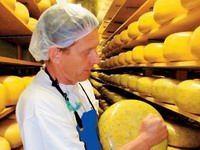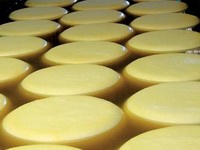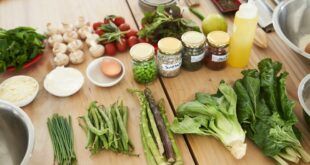Article by Sue Miller. Reprinted with permission from ACP Media (Farm Trader).
 Greeting customers is likely to be Ineke Alfrink, wife of Alfred the cheesemaker, who's been an integral part of the business since its small beginnings when Alfred used to load the cheeses into a car and take it around the district, selling direct to their growing customer base.
Greeting customers is likely to be Ineke Alfrink, wife of Alfred the cheesemaker, who's been an integral part of the business since its small beginnings when Alfred used to load the cheeses into a car and take it around the district, selling direct to their growing customer base.
They'd been making their Dutch-style cheese from their north Waikato dairy farm for several years when one Friday afternoon in 1983, Alfred heard that the small shop in Mercer was for sale.
He made one of those impetuous, life-changing decisions; bought it on the Monday, opened it soon after, and since then the fledgling business has gone from strength to strength.
Making cheese seems to have been a natural progression for Alfred Alfrink, who grew up in Holland, originally training to work in the Dutch timber industry.
He came to New Zealand in 1973 after getting a job through a friend who worked for a Palmerston North forest research team. After numerous trips between New Zealand and Holland, he realised his dream was to start making his own cheeses, so in 1979 he found a job in a cheese factory near Rotherdam (where a lot of cheese is made, much of it from raw milk), and methodically went about learning a whole new trade.
When he had built up a sufficient level of knowledge and confidence, he bought some cheese-making equipment, put it on a ship to New Zealand, returned here, found a farmer near Meremere who let him use a building on his property, bought two cows and set up on his own. Within two years, he'd built his herd up to 20 cows but soon recognised that to be economically viable he needed to grow the business further.
In 1983, around the same time he opened his shop in Mercer, he moved his cheese-plant to another dairy farm near Meremere, and for the next decade remained there, making his cheeses, slowly increasing his output, and using milk from his landlord's dairy farm.
By the early 1990s he had married and, with his wife Ineke, started looking for a small dairy unit where they could grow' their own milk and make it into their own cheese.
Eventually they found their dream farm 40 acres of land between Tuakau and Mercer, complete with house and milking shed, and a building suitable for making cheese.
It was here that they set about becoming totally self-sufficient cheese makers. Alfred purchased a herd of about three dozen Brown Swiss dairy cows a breed who have a higher protein level than most other breeds, and have been bred for supplying milk to be made into cheese.
 By 1997 he found that milking twice a day and making cheese was too demanding, so he sold his cows and 20 acres of land. He then found a neighbouring farmer who was prepared to supply him with milk to keep up with the increasing demand for his cheese.
By 1997 he found that milking twice a day and making cheese was too demanding, so he sold his cows and 20 acres of land. He then found a neighbouring farmer who was prepared to supply him with milk to keep up with the increasing demand for his cheese.
This arrangement is still working well. Three days a week, during the peak milking season, he collects 2600 litres of milk in the early morning and has it in the vat soon after.
By 8.30am he has added rennet, by 11 takes it from the vat and into containers where it is drained and pressed, by 2pm the presses are off and by 4pm it is all in brine where it sits for around 60 hours.
Then the rounds, weighing around 12kg, are stored for some months, depending on the type of cheese and how mature it is to be from three months for medium, nine months for mature and as much as a year for extra mature.
By the end of February this has dropped off to two days a week, and by the end of April he is able to take a break and focus on routine maintenance and the renovations to the old farmhouse he and Ineke are doing up. In August it starts over again.
Over the years, Mercer Cheese has won over 30 medals in the annual national cheese awards. The bulk of the annual cheese production is sold from the shop to regular customers, many of whom return for their favourites including Gouda, Edam, herb cheeses, some goat cheese, and the walnut soft cheese.
Alfred's cheese-making training was in Holland at a time when cheese was largely made from raw milk, and he's looking forward to a time when New Zealand cheesemakers have the option of returning to this traditional method.
He believes that using pasteurised milk for cheese destroys so much of value in the milk, and that skilled cheesemakers using healthy, safe New Zealand milk can produce healthy, safe cheeses.
He says there are some simple, additional rules and procedures that cheesemakers must follow to ensure there are no health risks from eating cheese made from unpasteurised milk.
In anticipation of this option becoming available in New Zealand, he has already been having his raw milk tested independently, and the results have shown it to be as safe as milk that has gone through the pasteurising process.
The Government has already moved to allow some cheese made from raw milk to be imported, and has a group looking at the possibility of allowing some to be manufactured here. Alfred is likely to be the first to apply, and sees a time when as many as 500 dairy farmers could be supplying raw milk to cheesemakers around the country.
Making cheese in a small building in the rural outback settlement of Onewhero is a long way from city-living in Holland. Many years ago, a school careers advisor told Alfred that he was ideally suited to working in a laboratory and in some ways that is where he has ended up.










- 10 years ago
*Albert Alferink